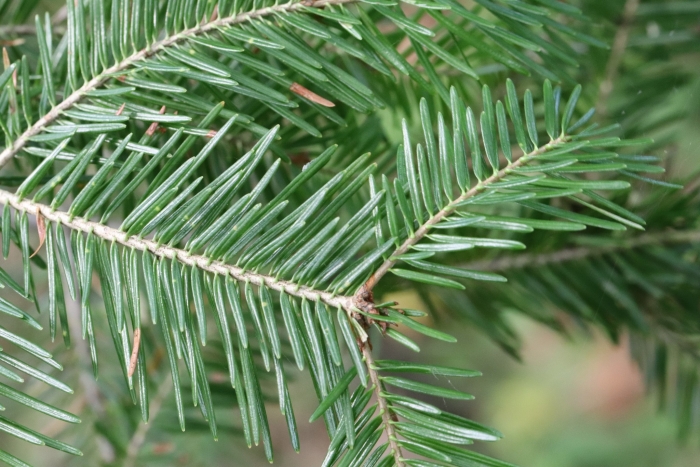Khingan Fir
(Abies nephrolepis)
Khingan Fir (Abies nephrolepis)
/
/

Nina Filippova
CC BY 4.0
Image By:
Nina Filippova
Recorded By:
Copyright:
CC BY 4.0
Copyright Notice:
Photo by: Nina Filippova | License Type: CC BY 4.0 | License URL: http://creativecommons.org/licenses/by/4.0/ | Rights Holder: Nina Filippova | Publisher: iNaturalist | Date Created: 2021-09-04T15:54:21-07:00 |

























Estimated Native Range
Summary
Abies nephrolepis, commonly known as Khingan fir, is an evergreen tree native to the cool temperate forests and mountainous regions of northeastern China, the Korean Peninsula, and southeastern Russia. It typically grows to a height of up to 98 feet (30 meters) with a narrow conic to columnar crown, making it a prominent feature of the landscape. The tree’s flat needle-like leaves are a glossy dark green on the upper surface, with two distinctive greenish-white stomatal bands on the underside. During the late spring to early summer, Khingan fir produces cylindrical cones that are 2-3 inches long and often very resinous, which can be a notable feature when present.
In cultivation, Khingan fir is valued for its attractive conical form and dense foliage, making it a popular choice for use as a specimen tree in large gardens and parks. It is also used for reforestation projects due to its fast growth rate. This species prefers full sun to partial shade and requires well-drained, acidic to neutral soil. It is relatively low-maintenance but can be susceptible to pests such as aphids and diseases like root rot if not properly cared for. While not commonly available, cultivars such as ’Pendula’ with weeping branches may be found in specialized nurseries.CC BY-SA 4.0
In cultivation, Khingan fir is valued for its attractive conical form and dense foliage, making it a popular choice for use as a specimen tree in large gardens and parks. It is also used for reforestation projects due to its fast growth rate. This species prefers full sun to partial shade and requires well-drained, acidic to neutral soil. It is relatively low-maintenance but can be susceptible to pests such as aphids and diseases like root rot if not properly cared for. While not commonly available, cultivars such as ’Pendula’ with weeping branches may be found in specialized nurseries.CC BY-SA 4.0
Plant Description
- Plant Type: Tree
- Height: 40-100 feet
- Width: 20-40 feet
- Growth Rate: Moderate
- Flower Color: N/A
- Flowering Season: Non-Flowering
- Leaf Retention: Evergreen
Growth Requirements
- Sun: Full Sun, Part Shade
- Water: Low, Medium
- Drainage: Medium
Common Uses
Low Maintenance
Natural Habitat
Cool temperate forests and mountainous regions
Other Names
Common Names: Khingan fir, Chinese fir, Hinggan Fir, Khinghan Fir, Manchurian Fir, Chou Leng Shan
Scientific Names: , Abies nephrolepis, Abies koreana f. prostrata, Abies nephrolepis f. chlorocarpa, Abies sibirica, Abies sibirica var. nephrolepis, Abies sibirica var. nephrolepis, Abies sibiriconephrolepis, Abies veitchii var. nephrolepis, Abies yoneyamae
GBIF Accepted Name: